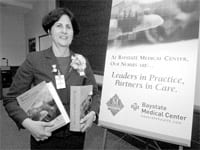Opinion – We Are All Patients,We Are All Healers
Terrorism is a vile disease, and when this disease strikes civilized society as it has in Boston, we are all afflicted. A sudden explosion turns all of us, immediately, into patients.
In times of crisis like this, we are all in pain. We suffer together. Each and every one of us has been violated. Innocents have been slaughtered and wounded; lives have been permanently damaged; a day of joy and celebration has been transformed into a day of mourning.
However, the disease of terror is not a fatal one. We New Englanders are fighters, and we are helpers, and within seconds of the Boston Marathon explosions, we went into healing mode. A photographer at the finish line used one hand to shoot pictures while, with the other hand, he tore down barricades to get to the wounded. Momentarily stunned medical personnel immediately transformed the first-aid tent into a field hospital. Friends and family rallied to assist and reassure one another, taking advantage of technology to reconnect and begin bouncing back.
Some bounce back faster than others. Here are some readily available resources that may be of assistance:
• The Federal Emergency Management Agency talks about coping with disaster at www.ready.gov/coping-with-disaster .
• The American Psychological Assoc. offers tips for recovering from disaster and other traumatic events at www.apa.org/helpcenter/recovering-disasters.aspx .
• The American Red Cross discusses recovering emotionally from a disaster at www.redcross.org/find-help/disaster-recovery/recovering-emotionally .
• The Disaster Distress Helpline, a program of the Substance Abuse Mental Health Services Administration that offers 24/7 phone and text response, talks about its services at disasterdistress.samhsa.gov/about.aspx .
Kevin Kennedy, Ph.D., is chief of Behavioral Health at Harvard Vanguard Medical Associates and a highly regarded expert in parenting. I asked him to provide some practical parenting tips to guide us in talking to our children about the disaster in Copley Square. Here’s his advice:
“Events like the tragedy at the Boston Marathon cause children to feel vulnerable and unsafe. This is unavoidable. It is important that parents be realistic about the fact that some people do bad things but that most people are nice.
“Children are reassured by order and structure, so it helps to maintain the usual schedule of routines and activities in the family. In an environment of 24-hour news, parents can help children by limiting their exposure to excessive television coverage. Repetition of troubling videos can convey a disproportionate degree of danger.
“For much the same reason, parents should limit the amount of conversation about the tragedy in the presence of their children. Be sure to ask if the children have any questions, and be alert to their concerns. Don’t be surprised if they want to remain close to home and need more than the usual attention or reassurance.
“Above all,” Kennedy notes, “parents can assure children of their love and affection and their intention to take good care of them.” –
Dr. Steve Adelman is director of Physician Health Services Inc., a corporation of the Mass.Medical Society. This article first appeared on Each Patient Counts, the weblog of the Mass. Medical Society.


Comments are closed.